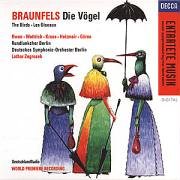| All Artists: Walter Braunfels, Lothar Zagrosek, Hellen Kwon, Matthias Görne, Deutsche Sinfonie-Orchester Berlin, Hans Braun, Siegfried Hausmann, Dirk Schmidt Thomas Kober, Iris Vermillion, Endrik Wodrich, Wolfgang Holzmair, Martin Petzold Michael Kraus Title: Braunfels - Die Vogel / Kwon · Wodrich · M. Kraus · Gorne · Holzmaier · Zagrosek Members Wishing: 0 Total Copies: 0 Label: Polygram Records Release Date: 2/11/1997 Album Type: Import Genre: Classical Styles: Opera & Classical Vocal, Historical Periods, Modern, 20th, & 21st Century Number of Discs: 2 SwapaCD Credits: 2 UPC: 028944867923 |
Search - Walter Braunfels, Lothar Zagrosek, Hellen Kwon :: Braunfels - Die Vogel / Kwon · Wodrich · M. Kraus · Gorne · Holzmaier · Zagrosek
 | Walter Braunfels, Lothar Zagrosek, Hellen Kwon Braunfels - Die Vogel / Kwon · Wodrich · M. Kraus · Gorne · Holzmaier · Zagrosek Genre: Classical
|
Larger Image |
CD Details |
CD ReviewsAn overlooked jewel marrano | 06/04/2000 (5 out of 5 stars) "I don't know what made me seek out this opera a couple years ago -- was it the rosette from the Penguin Guide, or a friend's rave review? In any case I have no regrets. Hearing "Die Vogel" is a little like hearing a great but forgotten Richard Strauss opera. Braunfels was apparently a favorite composer of the conductor Bruno Walter (and others), but is today little known outside of a rather limited priesthood of opera fans. He certainly deserves much better. His idiom is sweet and light, but rich in texture and historical resonance. Listening to this opera is a fascinating experience for the die-hard Strauss fan, who will come to better understand the fuller context of pre-war German opera. It's also an absolutely superb recording, the best I know of in the "Entartete Musik" series. Highly recommended!" A True Pleasure lamplight | Charleston, SC USA | 06/04/2006 (5 out of 5 stars) "I first heard Die Vogel at the Spoleto festival in Charleston, SC last year. I wanted a recording, but had great difficulty finding one until now. The music is pure and easy on the ears, the themes timeless, and the setting actually very current instead of in the drawing rooms of 18th and 19th century aristocracy. I took a first-time opera go-er with me, and she loved it! Share this hidden beauty! I hope more versions are recorded to allow the public a choice of varied interpretations." A revelation, worthy of further revivals Ralph Moore | Bishop's Stortford, UK | 05/04/2009 (4 out of 5 stars) "This opera was apparently a favourite of Bruno Walter and after its premiere in 1920 enjoyed fifty performances in Munich alone before the Nazis got to their wicked work and in 1933 drove out the half-Jewish Braunfels, when he was fifty years old and at the peak of his career.
There are definite echoes of Wagner in more relaxed mode, such as in "Die Meistersinger." However, comparisons with Richard Strauss are even more inevitable, even though Braunfel's idiom is generally more tender, naïve and light-hearted than Strauss. Both composers were drawn to the Greek classical world and the closest cousins to "Die Vögel" must be Strauss's "Daphne" and "Die Liebe der Danae", both in setting and style. The rôles of Daphne and the Nightingale have a great deal in common with their soaring melismata; there is a lovely moment at the end of Track 2 when Helen Kwon's top D is echoed by the flute and there is scarcely any difference in their timbres, so pure is her sound. I know nothing of the conductor Lothar Zagrosek but he seems to have a firm grasp of proceedings and prevents the music from sounding too uniformly pretty by injecting plenty of pace and drive into the proceedings when required. The choral singing from the Rundfunkchor is full and spirited, the orchestra is exemplary and the sound a model of clarity and balance. My favourite sections of the score are the extended love duet for the Nightingale and the human Hoffegut (Good Hope) that opens Act 2 - tenor Endrik Wottrich copes here with some heroic outbursts far removed from the world of German light opera - and the Chorus of Birds which follows it, when they are praising their citadel. I was assured by the pleasant gentleman who sold me this on ebay that I would enjoy it, and he was right. So why only four stars, especially when all other reviewers give five? Well, this is a personal preference, but I have an aversion to that throaty, "Kermit" sound affected by so many male German singers and I find that very much in evidence in the baritones of Wolfgang Holzmair and, particularly, Matthias Görne, who quite spoils the rôle of Prometheus for me, despite the adulation this Fischer-Dieskau protégé enjoys - but then, I am not a D-F-D fan, either...hear for yourself and don't hold it against it me if you disagree; taste in voices is rather subjective. Nor do I think that this is an absolute masterpiece; there are conversational longueurs in Act 1 and the music ultimately lacks the variety to sustain complete interest over two and a quarter hours, but I would encourage anyone who likes late Romantic music to become acquainted with this charming opera." |

 Track Listings (17) - Disc #1
Track Listings (17) - Disc #1